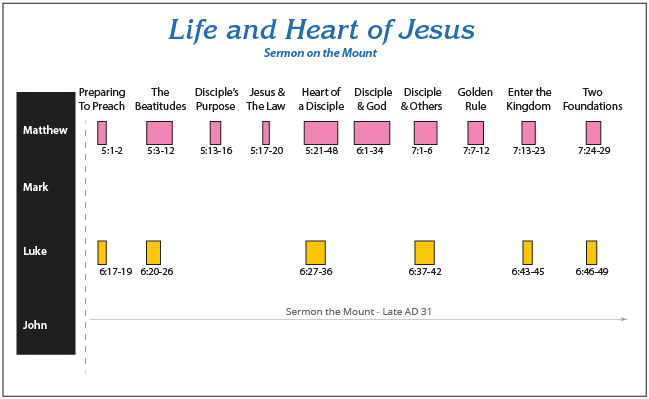In the Sermon on the Mount, Jesus has been describing the characteristics of those who believe in God and follow Him. He has told us that the poor in spirit, those who see themselves as spiritual beggars, will enter the kingdom of heaven. Those who mourn over their sin, are gentle, hunger and thirst for righteousness, are merciful, are pure in heart, are peacemakers, and are persecuted for the sake of righteousness will some day live in heaven. We have been told that we should forgive those who offend us and seek to make peace with another who has been offended by us. We have been warned not to lust, not seek revenge, not love money, and not to be judgmental of others. We have been encouraged to pray, to love God, to love others, and to trust God. Jesus’ Golden Rule was a call to lovingly treat others just as we would like to be treated. He has repeatedly called us to action, but nowhere did He ever say that we should believe. Nowhere in the Sermon on the Mount did Jesus ever tell us that we had to believe in God in order to go to heaven. His focus has always been on our conduct.
Wide And Narrow Roads
The same is true about the passage for this study (Matthew 7:13-29). It is the last passage in the Sermon on the Mount. Why has Jesus focused on external conduct? The answer is that one’s faith in God will be reflected in one’s conduct. In the opening two verses, Jesus prepares us for the point that He wants us to remember with these words,
Enter through the narrow gate; for the gate is wide and the way is broad that leads to destruction, and there are many who enter through it. For the gate is small and the way is narrow that leads to life, and there are few who find it. Matthew 7:13-14
Here we discover that there are two gates, two roads, two destinies, and two groups of people. The gates open to roads, the long roads end at distant destinations, but only some of the people will find God and live with Him forever. One gate opens to a wide way or wide road and the other gate opens to a narrow way or narrow road.
The Greek word that Jesus used for “narrow” in the phrase “way is narrow” is thlibo. The word refers to a road that is “narrow and troublesome” to travel. The road is not difficult because it has potholes, debris, or rocks on it. It is difficult because it is too narrow. As a result, it is very undesirable for the few people who are traveling it. The Greek word implies that the road is so narrow that people are crushing one another as they walk.

Only those on the narrow road get to heaven and see God face-to-face. Unfortunately, www.mapquest.com does not provide directions to the narrow road. Only Jesus can provide the necessary directions. In contrast, the wide road is comfortable and many are walking this road. It is pleasant, enjoyable, and filled with friends.
Have you ever wondered if you are a Christian? Do you wonder if you are going to heaven? Or, maybe you think you are walking on the narrow road already! Verse 14 warns us that “there are few who find” this narrow road. While the Greek word “find” reveals that some are actively seeking the narrow road, the word “few” warns us that not many are finding the narrow road.
Although a recent report says that 73% of Americans believe in God, it is clear from Jesus’ words that this number is not correct. Many are walking the wide road. The wide road is the main road. It is the road on which everyone starts. One must find and choose the narrow path in order to escape the wide road.
We will discover in the coming verses that even though many think that they are followers of God, some day they will discover they were not on the correct road. In the next thirteen verses, Jesus illustrates this truth in three different ways. Each illustration reveals the characteristics of those who are on the wide road. Only the last illustration reveals the characteristics of those on the narrow road.
Few Good Teachers (v. 15-20)
Jesus’ first illustration is about false teachers (Matthew 7:15-20; Luke 6:43-44). Since few are walking the narrow road, it is not a surprise that there are so many false teachers. Many false teachers are on the wide road.
Beware of the false prophets, who come to you in sheep’s clothing, but inwardly are ravenous wolves. Matthew 7:15 (NASB)
These are individuals who claim to believe in God. They think they believe in God. They call themselves Christians. They attended seminary, a Bible college, or have studied the Bible. They can quote scripture, but they are not true teachers. On the outside they look like they are followers of God, but inside they are vicious wolves seeking to convince us to believe a lie.

Need To Inspect Fruit. How can we identify a false teacher? Jesus tells us with these words.
You will know them by their fruits. Grapes are not gathered from thorn bushes nor figs from thistles, are they? So every good tree bears good fruit, but the bad tree bears bad fruit. A good tree cannot produce bad fruit, nor can a bad tree produce good fruit. Every tree that does not bear good fruit is cut down and thrown into the fire. So then, you will know them by their fruits. Matthew 7:16-20 (NASB)
Did you notice that Jesus did not tell us to ask them if they believe in Jesus, had a spiritual experience, went to seminary, are Spirit-filled, had an anointing, have spoken in tongues, or love Jesus? The test is not charisma or a warm personality. The test is not what one claims, but how one acts. Throughout the Sermon on the Mount, Jesus has been asking us about our outward conduct, not our inward belief. The same is true once again. This time He is focusing on the outward conduct of false teachers. This time He is warning us to look at the fruit of their lives. The test is, “You will know them by their fruits.”
But for what type of fruit does Jesus want us to look? The fruit we are to look for is not charisma, funny jokes, a pleasant personality, a great smile, smooth words, a big church, great sermons, wonderful music, or great looks. As we discovered in Revelation 2:20-23, even a false teacher can have a large church. In order to be a false teacher, the person must have students who are following him or her. Some false teachers have great crowds following them. Proverbs warns us not to quickly trust someone with these words,
The naive believes everything, but the sensible man considers his steps. Proverbs 14:15 (NASB)
We must remember that there are many who are on the wide road to destruction, including false teachers and students.
Looking For Fruit. Let us ask the question again, “What type of fruit should we look for?” The New Testament gives us a list of fruits for which to look.
First, a false teacher is focused on money. It is surprising how many passages in the New Testament warn that false teachers are preoccupied with money (1 Timothy 6:5; Titus 1:11; 2 Peter 2:3, 14; Jude 1:11). This is a very important sign of a false teacher. If you know a pastor who often talks about money, start looking for other fruits.
Second, false teachers are often proud (2 Peter 2:10-11,18). This is a sin that all of us have, but the false teacher is especially guilty. He or she is forever talking about their ministry, family, personal experiences, or what God is “doing through him/her.” They are constantly making sure everyone knows that “God is using him or her.” They are the key. They are important.
Third, false teachers cause divisions (1 Timothy 6:14). They grumble, find fault with others, deceive others, flatter people to gain advantage, and are not submissive. They seek control. They divide people and are critical of others. That is the message of several passages,
For there are many rebellious men, empty talkers and deceivers . . . Titus 1:10 (NASB)
These are grumblers, finding fault, following after their own lusts; they speak arrogantly, flattering people for the sake of gaining an advantage. Jude 1:16 (NASB)
Do you know someone who is not submissive to others, someone who is always finding fault with others? These two questions go together. These are the fruits of a false teacher.

Fourth, false teachers do not really understand scripture even though they study, teach and preach the Bible.
. . . wanting to be teachers of the Law, even though they do not understand either what they are saying or the matters about which they make confident assertions. 1 Timothy. 1:7 (NASB)
So they stray from the truth (1 Timothy 6:3; 2 Timothy 2:16-18). To those Christians who do not know their Bible, a false teacher sounds great. It is amazing how the Bible has been twisted, bent, distorted, and mutilated by those who appear to know the book. Yet, they are wrong. As a result, they deceive many and many accept their error.
If anyone advocates a different doctrine and does not agree with sound words, those of our Lord Jesus Christ, and with the doctrine conforming to godliness, he is conceited and understands nothing; but he has a morbid interest in controversial questions and disputes about words, out of which arise envy, strife, abusive language, evil suspicions, and constant friction between men of depraved mind and deprived of the truth, who suppose that godliness is a means of gain. 1 Timothy 6:3-5 (NASB)
Some years ago, some students from a Bible Institute in California went to a very large church in Berkeley, California. The Sunday morning service was pleasant and inspiring. The pastor baptized a baby. A missionary spoke about his work overseas. The music was familiar and encouraging, and the pastor’s message was very biblical. The pastor and church passed the tests that many would apply for concluding that the church was a “good church.” The pastor had charisma. He was humorous, pleasant, warm, and eloquent. Many would have returned and some might even have joined the church later.
After the service, the students had the opportunity to meet the pastor and ask him questions. The meeting had been pre-arranged. The meeting was designed to teach the students an important lesson. During the question and answer period, the students were stunned to discover that the pastor did not believe Jesus was God. He rejected the virgin birth. He believed that Jesus was only a man. The pastor was a false teacher to the surprise of the students. He was on the wide road.
Looking For A Church. Those who are looking for a new church usually listen to what the pastor preaches as the first test. If they hear nothing negative from the pastor’s sermon, they might conclude that the church is biblically solid if the sermon appears to be biblically solid. Fortunately the Bible Institute students discovered that one must do more than listen for error. They discovered that one should listen for what is not taught and ask questions. The great twentieth century British expositor Dr. Martin Lloyd Jones makes this significant statement,
The false prophet is always a very comforting preacher. As you listen to him he always gives you the impression that there is not very much wrong. He admits, of course, that there is a little; he is not fool enough to say that there is nothing wrong . . . In what way does this show itself in practice? I suggest that it does so generally by an almost entire absence of doctrine as a whole in its message. It always talks vaguely and generally; it never gets down to particularizing about doctrine. It does not like doctrinal preaching; it is always so vague. But someone may ask: “What do you mean by this particularizing about doctrine, and where do the strait gate and the narrow gate come in?” The answer is that the false prophet very rarely tells you anything about the holiness and righteousness, the justice, and the wrath of God. He always preaches about the love of God . . . He never makes anyone tremble as he thinks of this holy and august Being with whom we all have to do . . . He generally emphasizes one truth about God only, and that is love.[1]
False Teacher. It is not enough to look for biblical error in a teacher’s or preacher’s message. That is the obvious test. The not-so-obvious-test is that he does not teach what he does not believe. Look for what a teacher or preacher does not teach. Are only portions of the Bible taught? Why is application the only thing that is given? Where is the doctrine? Where is the meat of scripture? Why does this occur?

In Malachi 2:6-9 God condemned the ancient priests for selectively teaching scripture.
True instruction was in his mouth and unrighteousness was not found on his lips . . . For the lips of a priest should preserve knowledge, and men should seek instruction from his mouth; for he is the messenger of the LORD of hosts. But as for you, you have turned aside from the way; you have caused many to stumble by the instruction . . . you are not keeping My ways but are showing partiality in the instruction. Malachi 2:6-9 (NASB)
The priests were being partial in their instruction. Were they seeking to please the people? What is clear is that they were not teaching all of scripture. The priests were teaching only parts of the Bible. This is a problem with topical preaching. It can and usually does ignore major sections of the Bible.
If you ever look for a church, please be careful. It can take about 1-2 years before one can determine if a pastor is faithful in his teaching. Remember Proverbs 14:15. A man or woman can be a false teacher without blatantly committing doctrinal error. Look for the characteristics of a false teacher. The more you find, the greater should be your concern. There are more teachers who are walking the wide road than there are walking the narrow road. We must examine their fruit. Bad trees produce bad fruit. Good trees produce good fruit. Look for what they do and not what they say.
Few True Servants
Jesus’ next illustration in Matthew 7:21-23 is familiar.
Not everyone who says to Me, “Lord, Lord,” will enter the kingdom of heaven, but he who does the will of My Father who is in heaven will enter. Many will say to Me on that day, “Lord, Lord, did we not prophesy in Your name, and in Your name cast out demons, and in Your name perform many miracles?” And then I will declare to them, “I never knew you; DEPART FROM ME, YOU WHO PRACTICE LAWLESSNESS.” Matthew 7:21-23 (NASB)
“Lord, Lord . . .” and yet Jesus says, “I do not know you!” We often wonder how anyone could prophesy, cast out demons, and perform miracles and yet be rejected by God. These are signs that some Christians are seeking today as proof that they are real Christians. But Jesus warns us that one day He will reject some who practice these activities!
How did these people do these things if they were not believers who followed God? While it is obvious they were self-deceived, it is also obvious that others were following them. Miracle workers will have followers, and those who speak for God must have someone following or they will stop. They must have thought they were great since they prophesied and did great things.
It would appear that they had great “fruit.” Many probably thought they were wonderful Christians. But look closer at Jesus’ words. Why did He reject them? Jesus actually tells us. He tells us that they did not do the Father’s will. There is the answer. Once again Jesus did not say that they did “not believe.” The issue is that they did not do the Father’s will.
The Father’s will is contained in all of scripture. Unfortunately, there are few who care. Most of the world is on the wide road that leads to destruction.
Before we leave this passage, we must ask this question, “How did they claim that they had prophesied, cast out demons, and performed miracles?” The answer is that some may attempt to deceive God by lying, but God will know the truth. Another answer is that some will be self-deceived and think that they have served God. But probably the most stunning answer of all is that God performs miracles, speaks, and ministers through unbelievers too! The false Balaam is an example of this truth.
We are told in 2 Peter 2:15 and Revelation 2:14 that Balaam was a false prophet. Yet in Numbers 24:1-4 we are also told that the Holy Spirit came upon him. We are told in Numbers 24 that as Balaam lifted his eyes to see the Israelites, the Holy Spirit came “upon him,” and then Balaam blessed Israel. He prophesied. The false prophet was not a follower of God. The ministry of the Spirit resulted in prophetic predictions and a blessing upon Israel.
There are many on the wide road but few on the narrow one. The wide one is comfortable, but the narrow one is difficult. Is your Christian walk difficult? Does your obedience to God cost you anything? Are you pursuing holiness? Listen to Jesus’ words once again, “I never knew you; DEPART FROM ME, YOU WHO PRACTICE LAWLESSNESS.” Matthew 7:23 (NASB).

Few Real Christians
Jesus’ third illustration is about two houses (Matthew 7:24-29; Luke 6:46-49). One was built on the sand and the other on a rock.
Therefore everyone who hears these words of Mine and acts on them, may be compared to a wise man who built his house on the rock. And the rain fell, and the floods came, and the winds blew and slammed against that house; and yet it did not fall, for it had been founded on the rock. Everyone who hears these words of Mine and does not act on them, will be like a foolish man who built his house on the sand. The rain fell, and the floods came, and the winds blew and slammed against that house; and it fell—and great was its fall. Matthew 7:24-27 (NASB)
In Luke 6:49 describes the ruin of the house as great. Once again Jesus’ illustration is about our activity. Each house represents what you are building in this life. The sand represents spiritual stupidity and the rock represents spiritual wisdom. Only a spiritual fool will build his or her house on sand. The solid rock is the truth that Jesus taught. His teachings are revealed in the Bible. The shifting sand is worldly wisdom, cultural morals, and human philosophy – the very things that Jesus rejected.
Many are rejecting Jesus’ teachings. Oh, many like His teachings about loving others, having mercy, and being kind. Many like what they think the Sermon on the Mount is all about, but they do not like the part that we will read later in the gospels where Jesus declares that He is God.
Some are building their houses of Christian politics, moral campaigns, and building wonderful ministries, but the question that Jesus may ask some day is, “Do I know you?” Who is following His will? 1 Corinthians 12:3 tells us that only those who really belong to God will call Jesus “Lord” and do His will. Do you?
Conclusion
Throughout the Sermon on the Mount Jesus has been describing external obedience. It is the proof that you are a real Christian. You might agree with the crowd in the following passage, but it will not be enough.
When Jesus had finished these words, the crowds were amazed at His teaching; for He was teaching them as one having authority, and not as their scribes. Matthew 7:28-29 (NASB)
God is looking for more. He is looking for your heart to say, “I believe in you. I yield myself to you. I give myself to you. I am ready to serve you. What shall I do?” Is this you?
If you say, “Yes,” you are on the narrow road. It is marked with trouble as you seek to do His will and live a holy life. If you do, you will be building your spiritual house on Jesus Christ, and this narrow road leads to God.
References:
1. Martin-Lloyd Jones. Studies in the Sermon on the Mount. Inter Varsity Fellowship. 1974.